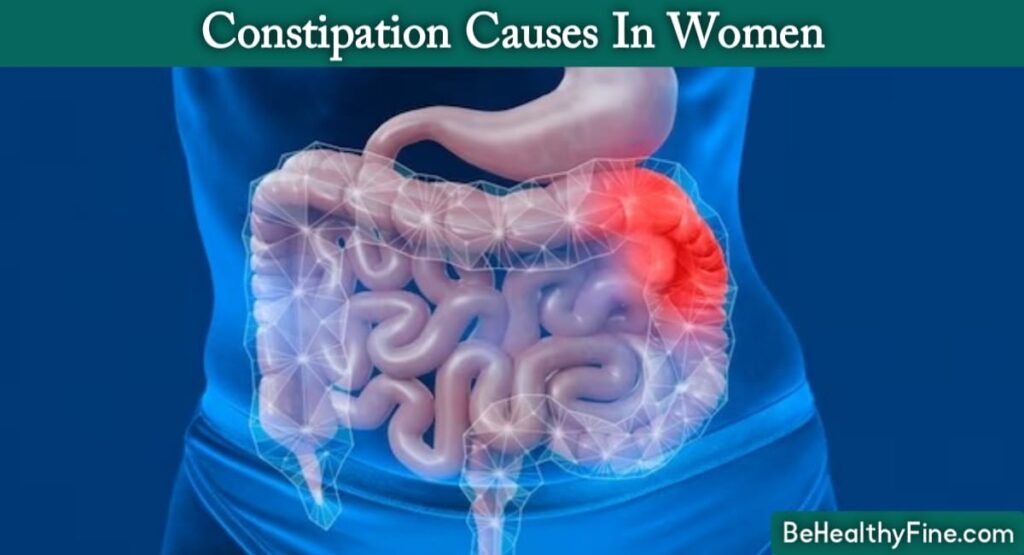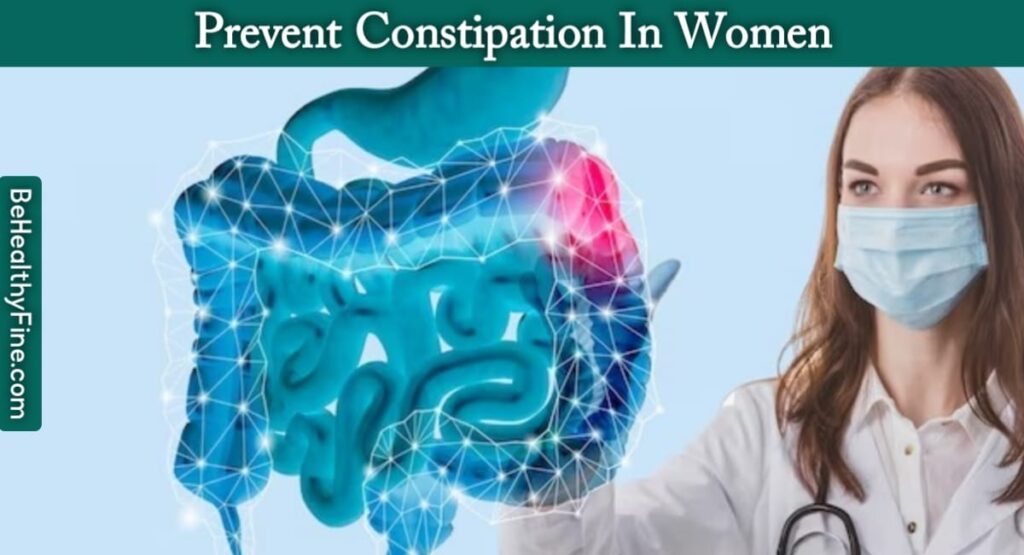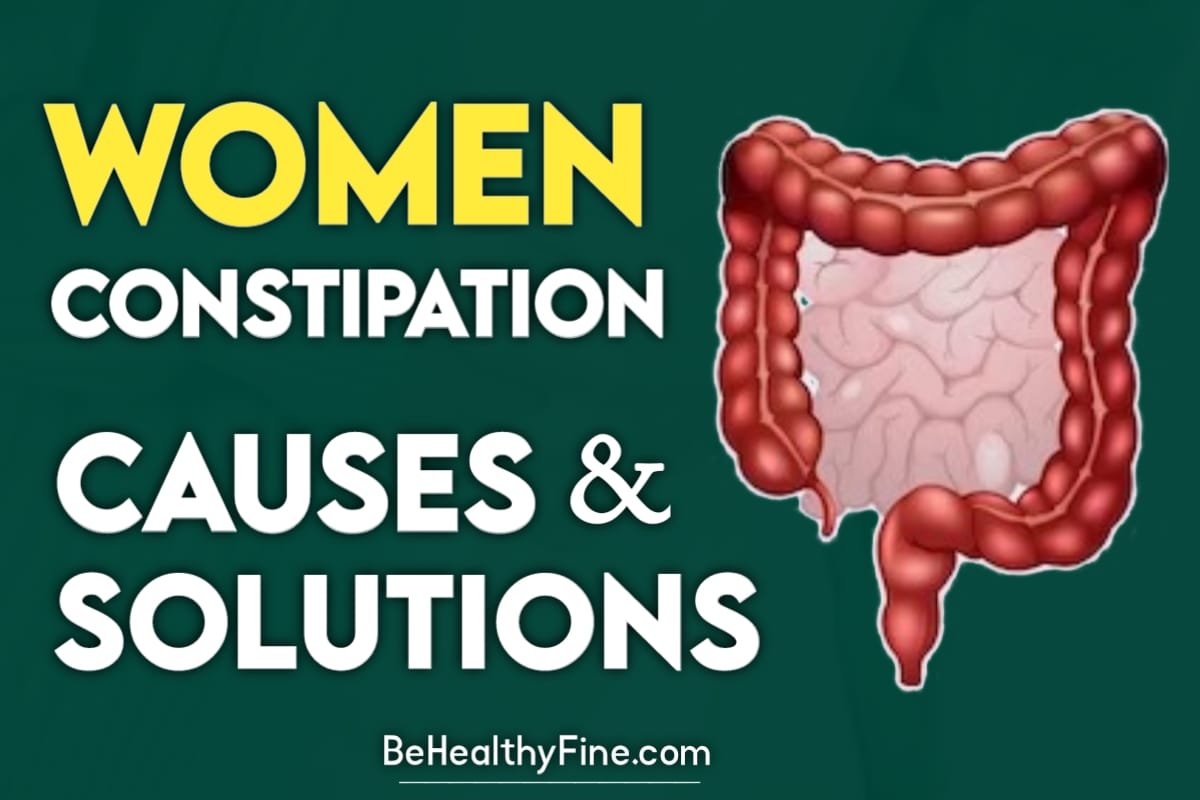Constipation is a common digestive issue that many women face at sometimes in their lives. You might think it’s not a big deal, but when you can’t poop regularly for a long time, It can seriously affect your health and how you feel.
In this article, we will talk about What Causes Constipation in Women? explore the causes, symptoms, and solutions for constipation in women, providing valuable tips to help manage and prevent this uncomfortable condition.
What is Constipation
Constipation, when you don’t go to the bathroom often or have trouble passing stool, which is really uncomfortable. It occurs because your colon absorbs too much water from your waste, making it hard and difficult to pass out from your body.
Lots of things can cause constipation in women, like dieting habits, lifestyle, medications, hormonal changes, health issues, and even stress. Knowing these reasons is important for finding the right treatment and avoiding constipation.
What Causes Constipation in Women

1. Diet’s Impact on Constipation:
If you’re not getting enough fiber from foods like fruits, vegetables and whole grains, it can cause constipation. Fiber helps make your stool solid by absorbing water and increasing its size. It promotes regular bowel movements and maintains proper digestion.
Eating these foods ensures you get plenty of fiber, which is really important for a healthy gut. So, make sure to include a mix of fiber-rich foods in your meals to stop constipation and keep your body healthy.
2. Healthy Living and Constipation:
Neglecting physical activity or exercise can slow down your digestion and bowel movements, which can lead to constipation. Additionally, ignoring the urge to go to the bathroom or continuously delaying bathroom breaks can mess up your bowel function.
It’s important to stay active and listen to your body’s signals to maintain healthy bowel movements and prevent constipation. Therefore, you should try to include regular exercise in your daily routine and respond immediately when nature calls. [Instant Relieve Constipation]
3. Drug Effects on Constipation
Some medicines like painkillers, antidepressants, and iron supplements can cause constipation as a side effect. It’s important to discuss any concerns you have about your medications with a healthcare provider.
They can give you advice on how to deal with constipation while making sure you’re still getting the treatment you require. Always keep your healthcare provider updated about any changes in your symptoms or worries about your medication.
4. Hormonal Changes in Constipation
Hormonal shifts during menstrual cycles, pregnancy, or menopause can mess with bowel movements and cause constipation in women. Estrogen and progesterone levels can throw off gut function and how long it takes for food to move through your system.
It’s common for women to experience constipation during these hormonal changes, so if you notice changes in your bathroom habits during these times, there’s usually no need to worry about that.
5. Health Issues and Constipation
Conditions such as irritable bowel syndrome (IBS), hypothyroidism, diabetes, or neurological disorders can disrupt your regular bowel function and cause constipation.
Getting an accurate diagnosis of these conditions and receiving appropriate treatment is important to deal with constipation. Your doctor can help you determine the most effective strategies for managing your symptoms and maintaining optimal digestive health.
6. Physical Causes of Constipation:
When there are problems with the structure of your colon or rectum, like pelvic floor dysfunction or rectocele, it can make it hard to pass stools and lead to constipation.
These issues might need special treatment from healthcare experts who understand how to deal with them. So, if you’re experiencing constipation and suspect it might be due to structural problems, it’s important to talk to your doctor for the right diagnosis and treatment.
Suggest to Read: Best Beginner Diet Plan for Female Weight loss
Suggest to Read: 21 Days Effective Weight loss Challenge
7. Mental Influences on Constipation:
For some women, stress, anxiety, or feeling down can mess with their gut and cause constipation. It’s important to find ways to manage these feelings, like relaxation techniques, mindfulness, or talking to a therapist.
By taking steps to reduce stress and improve mental well-being, you might find relief from constipation symptoms. Don’t hesitate to seek support if you’re struggling with these issues and experiencing constipation as a result.
Symptoms of Constipation in Women:
In addition to infrequent bowel movements or difficulty passing stools, constipation in women may present with other symptoms, including:
Pushing hard when going to the bathroom: where you push hard to pass stool, is a common symptom of constipation. It can lead to discomfort and even rectal bleeding if not addressed immediately.
Feeling like you didn’t finish: You know that feeling when you’ve gone to the bathroom, but it still feels like there’s something left inside? That’s a common sign of constipation. It can stick around, making you uncomfortable and feel like you have to push hard when you go to the bathroom again. [Instant Relieve Constipation]
Feeling like something is blocking the rectum: Experiencing a sensation that the rectum is blocked, making it difficult or uncomfortable to pass stool, is a common symptom of constipation. This feeling of obstruction can contribute to further discomfort and may indicate the need for intervention to relieve the blockage.
Abdominal discomfort or bloating: When your belly feels uncomfortable or swollen, like it’s full or tight, that’s a usual sign of constipation. It can be mild or really bothersome and might get worse after you eat.
Hard or lumpy stools: When you’re pooping hard or lumpy stools instead of soft, smooth ones, that’s a clear sign of constipation. These kinds of poops can be tough and hurt when you go, making you feel even more uncomfortable and strained during bathroom trips.
Bottom bleeding from pushing too hard: Rectal bleeding or noticing fissures, small tears in the skin around the anus, especially after straining during bowel movements, is a concerning symptom of constipation. It indicates potential damage to the rectal area and should prompt medical attention for proper evaluation and treatment.
Loss of appetite or nausea: Experiencing a decreased desire to eat or feeling nauseous can be associated with constipation. These symptoms may arise due to the discomfort and abdominal distension caused by the condition, impacting overall appetite and digestion.
Diagnosis and Treatment:
If you’re dealing with long-term constipation, it’s important to talk to a healthcare professional for the right diagnosis and treatment. Your doctor might check out you physically, ask about your medical history, and might order some tests like blood tests, a colonoscopy, or imaging tests to figure out what’s causing the constipation.
Preventive Treatments for Constipation in Women

Dietary modifications: Changing what you eat can be an easy and helpful way to deal with constipation. If you eat more foods with fiber, like fruits, veggies, whole grains, and beans, it can help you go to the bathroom regularly.
Fiber makes your poop bigger, so it’s easier to pass out from the body, and it keeps your stomach working well. So, when you’re decide to eating, try to include lots of these fiber-rich foods to maintain your healthy digestion. [Instant Relieve Constipation]
Hydration: It is really important to drink enough water to keep your bowel movements healthy. When you drink lots of water throughout the day, it helps soften your poop, so it’s easier to go to the bathroom.
Being well-hydrated is good for your whole digestive system and can be an easy and helpful way to stop or ease constipation. So, don’t forget to keep drinking water to keep your digestion working smoothly.
Lifestyle changes: Incorporating lifestyle changes like regular exercise and establishing a consistent routine for bowel movements can have a positive impact on regulating your digestion. Engaging in physical activities like exercise, walking, running, jumping, jogging helps to stimulate bowel movements and promotes overall digestive health.
Additionally, sticking to a regular schedule for bathroom visits can train your body to have more predictable bowel movements, reducing the likelihood of constipation. So, consider making these simple lifestyle adjustments to support a healthy digestive system.
Medications: In certain situations, your healthcare provider may suggest using laxatives or stool softeners to ease constipation symptoms. These medications can help soften stools or stimulate bowel movements, providing relief from constipation discomfort.
However, it’s important to use them under medical supervision and only as directed, as misuse can lead to dependency or other complications. Always consult with your doctor before starting any new medication regimen for constipation.
Management of underlying conditions: Dealing with medical conditions like irritable bowel syndrome (IBS) or hypothyroidism is essential for managing constipation well. When these conditions are treated, it can help improve how your bowels work and give you relief from constipation symptoms.
It’s crucial to consult with your healthcare provider to figure out and handle any underlying conditions causing your constipation. This ensures you get thorough and personalized care that fits your needs.
Behavioral therapy: For constipation linked to psychological factors or pelvic floor dysfunction, behavioral therapies like cognitive-behavioral therapy or biofeedback therapy can be helpful.
These therapies aim to address underlying issues contributing to constipation and teach techniques to improve bowel function. If you’re struggling with constipation due to psychological factors or pelvic floor dysfunction, consider talking to your healthcare provider about these therapeutic options for effective management. [Instant Relieve Constipation]
Conclusion
Understanding What Causes Constipation In Women is essential for effective management and prevention of this uncomfortable condition. Various factors, such as dietary habits, lifestyle choices, medications, hormonal changes, and medical conditions, can contribute to constipation.
Symptoms include infrequent bowel movements, difficulty passing stools, abdominal discomfort, and bloating. Treatment options range from dietary modifications, hydration, and lifestyle changes to medications and management of underlying conditions.
Additionally, behavioral therapies like cognitive-behavioral therapy or biofeedback therapy may be beneficial for constipation associated with psychological factors or pelvic floor dysfunction. Consulting with a healthcare professional is important for the proper diagnosis and personalized treatment.
By taking proactive steps and making necessary adjustments, women can alleviate constipation symptoms, leading to improved gastrointestinal health and overall well-being. Thank you for Read this Article, don’t forget to checkout this [Instant Relieve Constipation]
Frequently Asked Questions (FAQs)
What Foods Cause Constipation in Women?
Foods low in fiber, such as processed foods, dairy products, and red meat, can contribute to constipation in women. Additionally, consuming too much caffeine or alcohol and not drinking enough water can worsen symptoms.
It’s important to include plenty of fiber-rich foods like fruits, vegetables, and whole grains in your diet to promote regular bowel movements.
How to Get Rid of Constipation Fast?
To relieve constipation quickly, try drinking plenty of water to hydrate your body and soften stools. Increasing fiber intake through fruits, vegetables, and whole grains can also promote regular bowel movements.
Gentle exercise, such as walking or yoga, may help stimulate digestion. Over-the-counter laxatives or stool softeners can provide immediate relief, but use them cautiously and follow package instructions.
What Foods Soften Stool?
Foods rich in fiber, such as fruits like prunes, apples, and pears, vegetables like spinach and broccoli, and whole grains like oats and brown rice, can help soften stool.
Additionally, foods high in healthy fats, such as avocados and nuts, and those containing probiotics, like yogurt and kefir, can also contribute to softer stools.
Can Stress Cause Constipation?
Yes, stress can definitely increase constipation. When you’re stressed, your body releases hormones that can disrupt digestion and your intestinal activity, which can lead to constipation in some people.
Additionally, stress can change the way you eat and live, which can make constipation worse. Finding ways to manage stress, such as relaxing, exercising, or seeking help from friends, family, or a therapist, can help reduce constipation symptoms.
Where is Constipation Pain Female?
Constipation pain in females is typically felt in the lower abdomen, near the pelvis. It can vary from mild discomfort to sharp, cramping pains.
Some women may also experience bloating or pressure in the abdominal area due to constipation. If you’re experiencing persistent or severe abdominal pain, it’s important to consult with a healthcare professional for proper evaluation and management.







